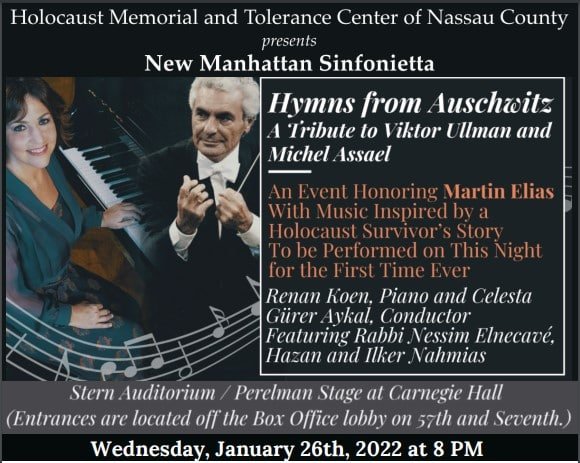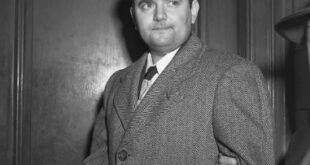
New Manhattan Sinfonietta brings together soulful premiéres this time. In this meaningful concert, “Hymns
from Auschwitz” Hazans and piano orchestral piece by Elcil Gürel Göçtü, the young composer of Renan Koen’s student movement March of the Music, K.491 C minör piano concerto by W.A.Mozart, which Koen will perform in memoriam of Viktor Ullmann and the “Auschwitz” Symphonic Poém by survivor Michel Assael, which was found after the passionate research of Dr. Joe Halio and assisted by Koen, will be performed.
This moving musical score was written by Michel Assael, a Jewish musician, and composer from Salonika, Greece. After surviving Auschwitz, Assael wrote this piece in memory of all that was lost. The piece was written in 1947 but has never been performed. It has recently been rediscovered and will be given its debut performance at this not-to-be-missed concert.
This event is also in memory of Viktor Ullman, a Silesian-born Austrian and renowned composer, and conductor who was sent to Terezin where he organized concerts and performed during the war. Ullman was ultimately deported to Auschwitz and was killed in the gas chambers.
We’re proud to honor Martin Elias, a steadfast supporter of Holocaust and tolerance education. We thank Martin for his generosity and support in making this concert a reality.
Michel Assael
Michel Assael was born in Thessaloníki, Greece on November 18, 1918. His parents, David and Doudoun Assael, were part of a well-established and flourishing Sephardic Jewish community. Although neither parent was a musician, Assael’s mother had a passion for music. They were certainly not affluent, but somehow there was money for piano lessons for Michel and his two sisters, Lily and Yvette, which would prove to be crucial to the survival of the three siblings in the concentration camps. As a young man Michel showed great promise as a pianist and composer. After attending L’Ecole Francaise through high school, he was admitted to the city’s Conservatory of Music.
During his time at the conservatory, Michel helped Lily, who was also becoming a well-known piano teacher, to support the family by playing piano for the silent movies in town. It was through this experience that Michel discovered his love for cinematic music and developed a superb ability to sight read musical notation, a skill which allows a musician to play any piece without practice. His reputation grew, and he became a sought-after accompanist for international musicians and vocalists on tour throughout Greece. He also played popular music on the accordion in nightclubs.
Assael’s dreams of becoming a film composer and continuing his concertizing were aborted when the German Nazi Party invaded Greece and completely destroyed the Sephardic community of Salonica, the largest urban Jewish population in Europe. He was deported with his parents in April of 1943, as were Lily and Yvette on different transports. Upon arrival at Auschwitz-Birkenau, they were immediately separated. He never saw his parents again. Assael soon met up with Dr. Albert Menache, a leader of the Sephardic community in Salonica as well as an accomplished flutist. During their captivity Assael and Menache were both enlisted into the men’s orchestra, which enabled them to survive the brutality and inhumane treatment. They were surrounded by other prominent Jewish musicians, some hailing from the Berlin Philharmonic. His sisters were enlisted into the women’s orchestra. The story of their survival was included in the film “Playing for Time,” which documents the history of the women’s orchestra. Lily Assael Hassid later became the first piano teacher of Murray Perahia, world-famous pianist.
Having barely survived typhus, Assael was among the 2,000 of 72,000 Greeks Jews who returned home after the liberation. Despite many attempts to restart his life and career there, the community was too depleted to support a musician or music teacher. Nevertheless, Assael’s passion for composing continued to burn. It was during this time in Greece, when again all seemed hopeless, that Assael composed his Auschwitz Symphonic Poem. Inspired by Dr. Menache’s memoir, Birkenau—Auschwitz II, he dedicated it to the victims of the Holocaust and all that was lost.
After five years of persistent application to emigrate and pursue his musical career in America, Michel was finally awarded a scholarship through the B’nai B’rith foundation to attend the New York College of Music (currently the Mannes School of Music/the New School). During this time Assael continued to compose. His works include Mediterranean Suite, Film Suite, a piano sonata, and a sketch for a string quartet.
Despite a language barrier and financial hardship, he graduated with honors and received the Most Distinguished and Promising Composer Award. Life improved. Michel married Lillian Algava; they had a daughter, Deborah Assael, currently a professional cellist in New York; and he started his very successful dance band, Michel and Papes Orchestra. His band became the premier musical ensemble in the Sephardic and Greek communities of New York City and the tri-state area. The band played for thousands of weddings, bar mitzvahs, and fundraising affairs, often being booked many years in advance to ensure their availability. Among the many events the band performed at was an evening at the apartment of Aristotle Onassis and his wife Jacqueline Kennedy Onassis. The guests included the conductor and well-known composer Leonard Bernstein, who sat in with Assael and his musicians. Assael was later interviewed by the Shoah Foundation. He was also chosen to be one of three musician survivors to participate in a BBC film commemorating the 60th anniversary of the liberation, titled Holocaust: A Music Memorial Film from Auschwitz.
Michel Assael passed away on July 25, 2006, having never heard his symphony performed. After seventy-five years, it will be presented for the first time tonight. This concert represents a validation of his life as a serious composer and musician. His daughter, grandchildren, and many family members are honored to be in attendance this evening.
 eSefarad Noticias del Mundo Sefaradi
eSefarad Noticias del Mundo Sefaradi

